Curtain Open
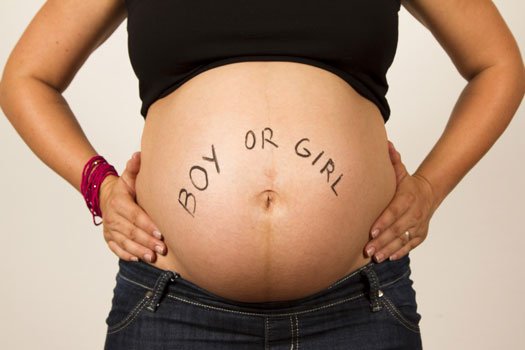
Source: Anna Langova, under a CC0 license.
So far, I've examined 5 of sex researcher John Money's criteria for determining a person's sex/gender: chromosomes, gonads, hormones, genitals, and brains. The 6th element (not the sequel to the Luc Besson movie, unfortunately) of gender is a person's assigned gender, also called sex of rearing. It's probably the first thing a new father wants to know after making sure his wife and child have made it through: "is it a boy or a girl?"
These days technology allows the sex to be determined much earlier, but traditionally it was discovered at the moment of birth. You often see this taking place in movies, when an unusually clean-looking, non-purple, and 3-month-old-looking baby — so old they could easily cast Winston Churchill in the role — is born and the deliverer checks downstairs and announces the baby's sex, and said baby is then raised as a boy or a girl.

"All babies look like me. But then, I look like all babies." - Winston Churchill
Source: Petr Kratochvil, under a CC0 license.
That's of course when the downstairs is unambiguous. Otherwise we get what I call "Penrose babies". But that was the subject of another post.

Penrose stairs. Downstairs if you go clockwise, upstairs if you go counter-clockwise. Very ambiguous!
Source: Sakurambo, under a CC0 license.
The subject of this post is to determine the extent to which parents stereotype the gender of their child. After all, as already mentioned, it's called the assigned gender or sex of rearing. But who's assigning the gender? Who's doing the rearing? The terms seem to imply it's the parents. Let's see to what extent that's true.
Biology as the lit match in the gender forest

Source: Pxhere, under a CC0 license.
Let me just put it out there, at the very outset, that stereotypes are not necessarily false. It's also possible they could be true only to an extent. They could, also, be true initially to a small degree, and then be made more true by our actions. Sex differences researcher Dianne Halpern writes that:
many stereotypes reflect real (i.e., statistically associated) group differences [...], and by learning and endorsing them, individuals may be unconsciously selecting environments that increase or decrease these differences.[1]
This might be what's happening with boys and girls. They might, as a group, have real (but small) statistical differences to which parents, or other agents (including the children themselves) are reacting to. They may, afterwards, for whatever reasons, cultivate these differences even further by, for example, choosing distinct and binary environments that strengthen their differences. These choices may cause changes in their brains, and those changes in turn may lead to lopsided experience-seeking:
What people learn influences brain structures such as dendritic branching and cell size; brain architectures in tum, support certain skills and abilities, which may lead people to seek additional similar experiences[1]
So biology gives you the initial kick in the butt in the male or female direction of the hill, and the downward slope of socialization may take care of the rest.

A sciency graphical representation of a slope to make my analogy more legit.
Source: Biswajit Banerjee, licensed under the Creative Commons Attribution 3.0 License.
This process can feed on itself, and before you know it the hardly distinguishable newborns have become gendered teens exhibiting quite dissimilar traits. The biological match has done its work on the gender forest!

Source: Pxhere, under a CC0 license.
Scientists experimenting on 31-hour-olds
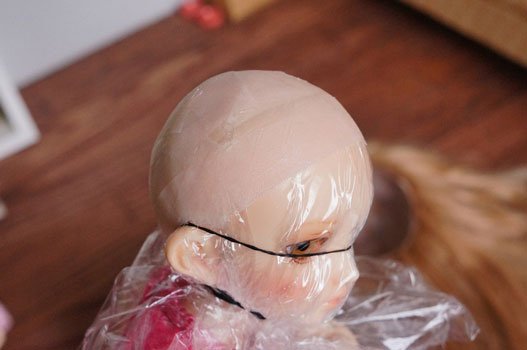
Um...creepy.
Source: Judi Cox under Attribution 2.0 Generic (CC BY 2.0) license.
Some of the biological matches that go on to cause social gender fires are real, and others are imaginary. In other words, some differential treatment is based on inaccurate stereotypes, and some on accurate stereotypes. For example, one stereotype has it that newborn girls are more tactilely sensitive than newborn boys. Another stereotype has it that newborn boys are stronger than newborn girls. Only the latter is an accurate stereotype. How do we know? Science! How did scientists find it out? Hilariously!
Take the tactile sensitivity tests as an example. Among other methods, researchers removed blankets from newborns, shot jets of air to their abdomen, tickled their big toe, applied cold disks, and lightly brushed their mouth. Here's three quotes that I find very entertaining because it's so easy to give them a sinister spin:
cotton and cellophane placed lightly over the infant's nose and mouth.[2]
In an item called defensive movements, the tester placed a cloth firmly over the supine baby’s face for a few seconds.[3]
In an apparently related item, rate of habituation, a pen light was repeatedly shone on the infant’s eyes, and the number of blinks counted until the infant no longer reacted (shuts-off).[3]
Muscle strength, if you're wondering, has been measured, for example, by placing the infant in a prone position and measuring head tilt. Other experiments involved grip strength.
Historically, both tactile sensitivity and muscle strength tests yielded conflicting results, in that when the studies were considered together, the result was nil.
To settle the issue, 3 researchers examined 3 independent samples of newborns totaling 204 infants in number and averaging 31 hours in age. They then re-did some of the experiments described above.
Tallying it all together, the study found "no difference between male and female newborns in tactile sensitivity", and "greater muscle strength in males than in females".[2]
Note that:
There was no sex difference in weight in the three samples, thus eliminating the possibility that sex differences in strength may be accounted for by sex differences in weight.[2]
I'm telling you all this to give you some concrete examples of research on stereotypes before socialization has occured. The real point, however, is not tactile sensitivity and muscle strength specifically, but the implications of finding out that some stereotypes are real:
The newborn sex difference in muscle strength may have significant implications for sex differences later in life. If newborn boys and girls, on the average, stimulate their parents differently, the parents may respond with differential treatment for the two sexes.[2]
In other words, actual biological differences may sometimes be the cause behind differential treatment and stereotyping of the sexes. Playing with boys as well as handling them more roughly, perceiving girls as more fragile than boys, could all be based on signals parents are receiving from their infants, rather than projection of false stereotyping on the part of the parents.
However, as described in the previous section, this treatment may feed upon itself, and cause an increase of male strength and female fragility that is unwarranted by pure biology. This creates "a circular process which continues through substantial segments of development."[2]
But how do we know for sure whether it's real differences in infants or unwarranted parental prejudices that guide future development? Do we have to do experiments for every single trait, like we did for tactile sensitivity and muscle strength? Plus, some differences may arise later, and at that point socialization has already occurred, and separating cause from effect at that point isn't as easy-peasy as it is with 31-hour-olds:
The relationship between a parent and a child is transactional [...], which means that the parent's behavior is, in part, a reaction to the child's current and previous behavior and that the child's behavior is, in part, a reaction to the parent's current and previous behavior. Untangling the causes from the effects may be impossible.[7]
It appears we need an easier, more all-encompassing way of determining the extent to which parents influence their children. It's time to move on to the gist of this post!
Do parents stereotype infants?

♂ & ♀ cotton candy.
Source: Abdulaziz2580 under Creative Commons Attribution-Share Alike 4.0 International license.
A lot of research has been done on infant stereotyping by adults based on the infant's sex. The studies can be done by videos and photos, but they're often done by live interaction. This might involve dressing an infant in neutral clothing (what they aptly and funnily called "neutrally clothed infant stimuli"), then getting a non-parent adult into the room with the infant, stating the infant's sex differently with each adult, and seeing how the adults interact with the child. How, for instance, they play with it (roughly or softly), or what kind of toy they use to play with it (football or doll). How much they touch it, smile at it, talk to it, encourage activity, etc.
Or they later ask the adults to assess the child, giving them many binary adjectives to choose from, for example big/little, fast/slow, nice/mean, quiet/loud, smart/dumb, soft/hard, strong/weak, and the list goes on (affectionate, aggressive, assertive, calm, confident, cooperative, coy, cuddly, delicate, friendly, impulsive, independent, shy...)
So what, pray you, are the results?
Overall, the evidence that adults stereotype babies by gender is quite strong (Stern & Karraker, 1989).[5]
Thus wrote sex differences researcher Linda Mealey, in her book Developmental and Evolutionary Strategies. Not one to take an author on her word, I read the cited article. And found the wording to imply that almost the opposite was the case. The article, a review of 23 studies on the matter, quite unequivocally states, in conclusion, that:
The results of the present review suggest that caution be exercised in assuming that infant gender label studies provide strong evidence for early gender role socialization.[4]
Out of all the measured variables, only about 18% showed gender labeling. That's not much greater than chance (usually put at 5%), and it also didn't include studies that didn't get published because they failed to find significant effects.[4]
So overall, reading the same paper, I'd say the evidence that adults stereotype babies by gender is there, but it's not quite strong. Adults stereotype babies, but not very much so. Also, they seem to do it primarily when other information is lacking:
these findings suggest that knowledge of an infant's sex elicits a general stereotype that influences adult perceptions of the infant only when other information is absent or ambiguous[4]
Adults are much more sensitive to the child's actual personality traits than they are interested in imposing their own stereotypes. They will mostly try to direct the child's personality when an actual personality is lacking.
If that doesn't sound as convincing as you'd hoped, worry not. We're going to take a couple deeper dives into the matter forthwith.
Siblings
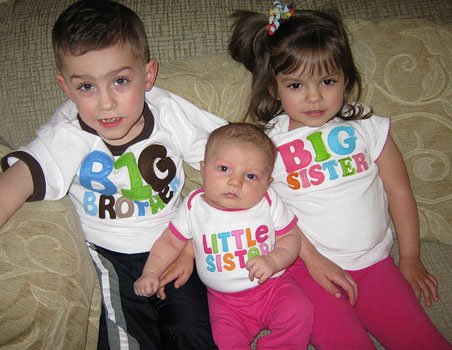
Child labeling in action. Someone call the authorities!
Source: Mcarls licensed under the Creative Commons Attribution-Share Alike 2.0 Generic license.
Often, studying things when they're broken gives you an insight into how they function under normal conditions. A paper evaluating past studies on the importance of parent and child influences on the development of conduct disorder (CD) concluded the following:
The results of these different lines of research, taken together, provide persuasive evidence that the child's own tendencies are stronger contributors to CD than are parental influences.[6]
Studies on anti-social behavior have similarly "demonstrated that childhood behavior is a better predictor of adult antisocial behavior than are family variables such as social class, parental antisocial tendencies, or divorce or separation of parents."[7]
Studying twins is usually the go-to method for differentiating environment from genes. Let's start with the less-related end of the DNA stick. Researchers found that:
By the time they are adults, adoptive siblings who were reared in the same home will, on average, bear no resemblance to each other in personality.[7]
Well, they are adoptive siblings, biologically dissimilar. What we need is a common soil to grow our seeds. Surely if the siblings were blood-related they would be much more simil...
Biological siblings who were reared in the same home will be somewhat more alike, but still not very similar.[7]
Fine. Whatever. But I'm pretty sure that twins, the ne plus ultra of behavioral genetics, will yield quite a different res...
Even identical (monozygotic) twins reared in the same home will not be identical in personality. They will not be noticeably more alike than identical twins reared in separate homes[7]
If you're an only child, you might be thinking, "well I'll be flagged!" But it might not come as such a shock to you if you were either blessed with a degree in developmental behavioral genetics, or cursed with a brother or sister.
Overall, studies in this field show that half of the psychological characteristics of a person can be explained by their genes, and the other half can hardly be explained by their home environments. Only around 0 to 10% of an adult's personality can be attributed to the home.
The implication [...] is that resemblances between siblings are due almost entirely to shared genes. Their shared environment has not made them more alike.[7]
But, if around half the personality is due to "nature" (genes), then the other half must be due to "nurture" (unless you know something I don't). But if the home and the parents and "their presence or absence in the home, the number of books or TV sets or guns the home contains"[7] do not contribute significantly to the "nurture" part, what does? What aspect of the environment plays a defining role in shaping the current and future personality of a child?
When things get shaky, I like to turn to our relatives to get my bearings back. After all, children are much like macaques, and by that I don't just mean that they are mischievous.
Monkey smile, monkey do selfie
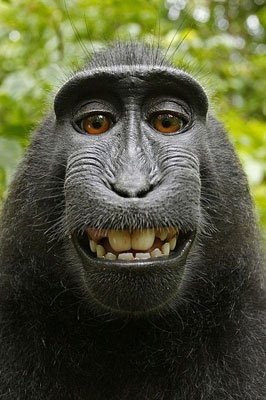-.jpg)
Macaque steals photog's camera and takes a selfie. True story.
Source: Macaque. Image is in the public domain because animals don't have copy rights.
Omark and Edelman, noting that macaques and baboons arrange themselves in dominance-submission hierarchies very early on in life, wondered if human children do the same. So they went and studied 3- to 7-year-olds.
They subsequently found a number of nearly exact parallels between macaques and human subjects.[3]
One similarity was that human males and females tended to sort themselves into same-sex groups and associate with same-sex children. Males engaged in fantasies about super-strength and, at least at 4 years of age, insisted that no other male is stronger than them. Females had no such preoccupations. By 6 years of age males were equally strength-obsessed and hierarchical, but were now more realistic: they no longer viewed themselves as stronger than everyone, and sorted themselves into "mutually agreed-upon hierarchies of strength"[3]. These assessments were often based on aggressive encounters or subtler threat behaviors. Girls, on the other hand, were "more interested in being liked"[3].
Most reports on macaque hierarchies have described the sexual continuum in just this way.[3]
The perceptive reader might have gotten the gist by now, and may think something along the following lines:
"So, let me get this straight, Alex. You're implying that, it's not parents who stereotype children, but rather, that children stereotype themselves?! Oh, it's gonna take something more than macaques taking selfies to convince me of that!"
Moving on now to "something more".
Home is not where the personality is

Examples of homes that lack personality.
Source: IDuke (modified by Sting) licensed under the Creative Commons Attribution-Share Alike 2.5 Generic license.
Let's briefly consider some examples of how the home might — but doesn't — influence personality. Let's start with these two: birth order and only children (=children without siblings).
You would think that birth order might influence the personality of a child, because for example the parents might be more inexperienced with their first child and more relaxed with the second; because the first child will experience undivided attention and then be suddenly dethroned by the arrival of a second child who, because of its vulnerability, enjoys greater attention; because the second child will necessarily have an older sibling that is stronger and knows how to go about the world better and might even bully the younger sibling in what the older sibling views as mere play. And surely having siblings than not having them at all influences your personality, right?
And yet studies and reviews show that's not the case. For example:
Ernst and Angst's conclusion, based on their own study of 7,582 young adults and on a survey of the world literature on birth-order and family-size effects, was that socialization within the family does not appear to play an important role in the formation of adult personality characteristics.[7]
And if you can't trust someone named Angst to tell you about young people, I don't know who you can trust.
Mom always loved you best
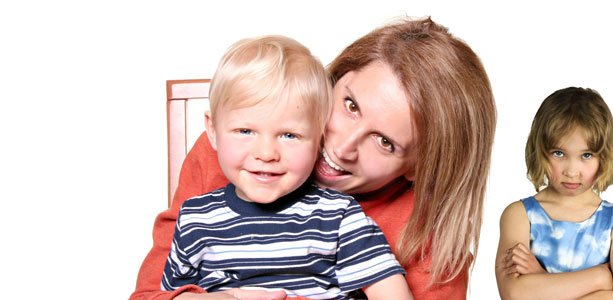
Source: White77 & martakoton, under a CC0 license, modified.
And Ernst and Angst's conclusion holds even when we know, rather provably, that Moms love their younger children more than their older ones:
Dunn and Plomin (1990) reported that two thirds of the American and British mothers they studied were willing to admit that they loved one child more than the other. Of this group, 80% of American mothers and 86% of British mothers said they felt more affection for the younger child.[7]
Yet even this heartwrenching fact "has no consistent effects on the development of a child's personality"[7].
And if such egregiously fundamental differences as birth order and the presence or lack of siblings and mother-love have little role to play in shaping our personalities, there's little hope that your gender socialization will be affected by subtle influences like what kind of TV show your parents like to watch, or who your parents are period:
parents in Western societies may be less concerned about gender distinctions than are the children themselves. A meta-analysis turned up no major differences between the ways parents treat their sons and daughters [...]. Recent efforts to rear children in an androgynous fashion have not reduced their sex-typed behavior or attitudes [...]. Children who grow up in homes headed by single mothers [...] or by lesbian or gay couples [...] are not less sex-typed than children who have two parents of opposite sexes.[7]
But if their parents aren't doing it, who's doing it?
The peer group
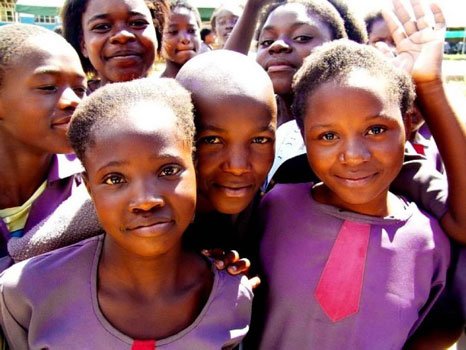
Source: USAID under a CC0 license.
There is a view that "children initially understand gender roles as social constructs (e.g., as arbitrary and changeable)"[11]. Lucky for us, there's also studies that probed just this idea.
The probing occurred by means of stories presented to children, followed by questions. The studies included children of varying ages, as well as adults. To give an example of a story, one study described a baby that was raised from birth on an island with either only members of the opposite sex, or only members of the same sex. The subjects were then asked about the characteristics this child will have in the future. For example, will a male baby raised on an island with only females, have more of the properties that are stereotypically associated with females?
It appears from the studies that children have essentialist beliefs. Essentialism is the idea that the category to which a member belongs necessarily determines its attributes. So if I know a thing is an apple, I know what properties it has. It couldn't possibly be non-round, for example, or have a green instead of a red color. Children generally have essentialist beliefs about many objects and living things, so it's no wonder that the study showed they had essentialist beliefs about gender categories, and that as they grew older they became more sensitive to the role the environment may play in shaping gender development.
These results suggest that by age 9 or 10 children begin to recognize that environmental factors may influence gender-role development. Prior to age 9, children seem to believe that members of a gender category share something like an intrinsic potential that is not yet obvious but will become manifest over time. They assume that a male will develop to be similar to other males, even when he is raised in an environment with only females. Thus, the findings [...] provide evidence that young children have essentialist beliefs about members of gender categories.[11]
I know what you're thinking: couldn't the children just be responding to stereotypes? Let's say, if a the subject of the story is labelled a boy, then necessarily it will like to play with footballs?
The researchers separated the property types into biological and stereotyped, to see whether the children were sensitive to the difference. If the children just blindly matched sex with stereotyped behavior for that sex, then they would match the subject 'girl' with the properties 'can give birth' and 'plays with dolls' an equal number of times, as if both were equally necessary properties of the subject 'girl'. But they didn't.
children's answers differed according to the property type (stereotyped or biological). [...] Children had a higher percentage of category-based responses for the biological properties than the stereotypical properties. This suggests that children considered each question separately and did not assume that the characters would have the properties stereotypically associated with their gender categories.[11]
In other words, "just because Mom & Pops told me so, doesn't mean it's so".
The role of adults

Always knew children are little shits!
Source: Wolf Gang licensed under the Creative Commons Attribution-ShareAlike 2.0 Generic license.
So far I've argued that parents don't play much of a stereotyping role in their children's gender. But it goes deeper than that: there's evidence that adults actually play a homogenizing and equalizing role in child socialization.
Consider for example a study where pairs of children were taken to their nursery school's playroom, where they were allowed to watch cartoons through a movieviewer that couldn't be accessed by more than one child at a time:
when the two children were alone together in the playroom, the boys got more than their share of access to the movie-viewer. When there was an adult present, however, this was no longer the case. The adult's presence appeared to inhibit the boys' more power-assertive techniques and resulted in girls having at least equal access.[9]
In the past, girls in preschools had been observed in locations closer to teachers compared to boys. This was often interpreted as evidence of a stronger affiliative trait in girls. Studies done on all-girl and all-boy groups, however, showed that children kept an equal distance (far, far away) from teachers. It was only when boys were introduced that girls moved close to the adults:
The behavior of girls implied that they found the presence of boys to be less aversive when an adult was nearby. It was as though they realized that the rough, power-assertive behavior of boys was likely to be moderated in the presence of adults[9]
In other words, Lord of the Flies may have been pretty much on the money about what would happen if boys were left to their own devices!
In conclusion to a summarization of much of this kind of research in the literature, sex researcher Eleanor Maccoby wrote:
I would place most of the emphasis on the peer group as the setting in which children first discover the compatibility of same-sex others, in which boys first discover the requirements of maintaining one's status in the male hierarchy, and in which the gender of one's partners becomes supremely important.[9]
Curtain Close

The bust of an ancient woman, is not visible here.
Source: Atlantios, under a CC0 license.
Ever noticed how hearing someone speak often allows you to pinpoint their decade of birth quite precisely? That's because children don't like to speak like their parents. They prefer to speak like their coevals and cohorts. That piece of a priori reasoning may have allowed you to intuit the conclusion of this post avant la article.
Having a brother or sister helps too, even if it's a twin one: we all know how different we are from our siblings, despite the identical home environment in which we grew up.
This makes evolutionary sense: monocultures are not too good for adaptation and survival, so adopting the culture of your home hook line and sinker, may not be the most ideal strategy. Diversifying is better:
The adaptive value of a well-developed bust-line has similarly received our attention.[3]
Wait. I got my quotes mixed up. Not easy to organize all these notes... Oh here it is:
Rowe [...] has pointed out that it would not make evolutionary sense for children to learn only from their parents; it would mean, for example, that children might fail to pick up useful innovations unless the innovator happened to be their parent. Rowe postulated an innate adaptive mechanism that directs the child to learn from any source, not just parents—a learning mechanism that is "general with respect to informational source"[7]
Hope you've learned something too. I know I did.
Till next time. x
REFERENCES
1. Halpern, D. (1997). Sex differences in intelligence: Implications for education. American Psychologist, [online] 52(10), pp.1091-1102. Available at: http://dx.doi.org/10.1037/0003-066X.52.10.1091.
2. Jacklin, C., Snow, M. and Maccoby, E. (1981). Tactile sensitivity and muscle strength in newborn boys and girls. Infant Behavior and Development, [online] 4, pp.261-268. Available at: https://doi.org/10.1016/S0163-6383(81)80028-8.
3. Freedman, D. (1971). An Evolutionary Approach to Research on the Life Cycle. Human Development, [online] 14(2), pp.87-99. Available at: http://dx.doi.org/10.1159/000271204
4. Stern, M. and Karraker, K. (1989). Sex stereotyping of infants: A review of gender labeling studies. Sex Roles, [online] 20(9-10), pp.501-522. Available at: https://link.springer.com/article/10.1007%2FBF00288198
5. Mealey, L. (2000). Sex Differences: Developmental and Evolutionary Strategies. 1st ed. Academic Press. Available online at: https://doi.org/10.1016/B978-0-12-487460-2.X5000-4
6. Lytton, H. (1990). Child and parent effects in boys' conduct disorder: A reinterpretation. Developmental Psychology, [online] 26(5), pp.683-697. Available at: http://dx.doi.org/10.1037/0012-1649.26.5.683
7. Harris, J. (1995). Where is the child's environment? A group socialization theory of development. Psychological Review, [online] 102(3), pp.458-489. Available at: http://dx.doi.org/10.1037/0033-295X.102.3.458
8. Maccoby, E. (1988). Gender as a social category. Developmental Psychology, [online] 24(6), pp.755-765. Available at: http://dx.doi.org/10.1037/0012-1649.24.6.755.
9. Maccoby, E. (1990). Gender and relationships: A developmental account. American Psychologist, [online] 45(4), pp.513-520. Available at: http://dx.doi.org/10.1037/0003-066X.45.4.513.
10. Zucker, K., Wilson-Smith, D., Kurita, J. and Stern, A. (1995). Children's appraisals of sex-typed behavior in their peers. Sex Roles, [online] 33(11-12), pp.703-725. Available at: http://dx.doi.org/10.1007/BF01544775.
11. Taylor, M. (1996). The Development of Children's Beliefs about Social and Biological Aspects of Gender Differences. Child Development, [online] 67(4), pp.1555-1571. Available at: http://dx.doi.org/10.2307/1131718.
Earlier Sex Differences episodes:
6: Sex Differences: Do females and males have different brains? Addendum
5: Sex Differences: Do females and males have different brains? Pt 3
4: Sex Differences: Do females and males have different brains? Pt 2
3: Sex Differences: Do females and males have different brains?
2: Sex Differences: Check out the gonads on that one!
1: Sex Differences: Does the Chromosome Maketh the Man?
steemSTEM is the go-to place for science on Steemit. Check it out at @steemstem or browse the #steemSTEM tag or chat live on discord
I agree with this. After all, stereotypes are labels and we do tend to live up to our labels. Just as stated by Halpern.
It has been fascinating to learn the findings of tactile sensitivity and muscle strength tests! After all, because of the adult x child relational identities, it is easy to assume the input is a one way road, but as you explained they might also be the result of an interaction.
This was the first thing that came to my mind when you asked how we thought adults would interact with the babies :)
I have done extensive reading about this topic lately. It is most interesting. I am glad you brought this up! :D
The information within 'Mom loves you best' is so insightful, and only confirms what no parent dares to voice (unless, it appears, to researchers!) Brilliant!
I always knew Golding was right. That book isn't a classic for nothing!😛
Incredible post Alxander, as usual.
Ps: I had been wondering why you hadn't post for a while. Good to read your work again :)
All the best.
Oh I've just been busy. Glad to be back into the fray! :D
Thanks for your feedback. Are you a parent btw? Can't recall if you ever shared that info. What's all that child-related reading for? ))
No, we don't have children :) We decided not to have children over 10 years ago. The child related reading is for studies/work, which also helps me understand better the little ones around me - nephew, niece, friend's kiddos etc.. :D
You take care !!
Best.
Hey @abigail-dantes
Here's a tip for your valuable feedback! @Utopian-io loves and incentivises informative comments.
Contributing on Utopian
Learn how to contribute on our website.
Want to chat? Join us on Discord https://discord.gg/h52nFrV.
Vote for Utopian Witness!
For me it would probably more a question like:
Alright, where are my new passports and fake identites?
Anyway. I was actually not aware of the relatively small influence of parents on the socialization of their children. Although it makes sense, at least in my case, since I'm the complete opposite of my relatives, especially my parents.
Nice work :)
Another great post Alexander.
Gender studies has gotten more and more fascinating as I've gotten older (or just the society around me has gotten more progressive.
I'd like to think I can be that perfect parent that doesn't stereotype via gender, but I don't think I'll ever keep things completely unbiased. A little bit of gender stereotyping probably isn't going to ruin childhood development, but I worry about my older family members maintaining some negative gender differences.
Complete freedom from bias is probably impossible. People have preferences, and inequalities of power in society means they will attempt to enforce their preferences through the media or politics or what have you. But we can aim to make things tolerably unequal :P
Are you already a parent or just thinking ahead?
Thanks for your continued readership & support ))
I have found that children in schools tend to segregate themselves into genders very early on. I find it weird, but it must come from somewhere ;-)
Upvoted (by @rycharde), resteemed (by @accelerator) and has been added to the latest MAP Upvotes post.
= Quality Content Creators can request to join MAP = see the Benefits = Free Membership =
Yup! Here's a quote from the literature:
Thanks for reading and sharing! )
Good to see this article is now doing very well! Glad I caught it early :-)
The flip side of this auto-segregation - it's somewhat like a chemical precipitation - is that those kids who wish to "cross over" are thought of as outsiders. They are not gay or trans; they seem to just enjoy a different energy and are happy to be in both groups. Somehow, this is verboten.
This does not bode well for adults.
Very true.
There was an event in history that tried to pin gender on socialisation, and prove that trans people were just "raised wrong". To do this after a kid had their genitals mutilated in an accident they were raised as a girl. Turns out they absolutely hated it.
I am not very experienced in socialisation in kids, but playing an "equaliser" role could create a dependence on it, meaning that without it the side they were trying to equalise (based on stereotypes?) would then fall into those stereotypes.
I don't see you commenting often, but when you do ..
Yes, I have read of those studies and I support your conclusions. It is by no means a problem of raising, but being raised in a very open family will mean that the child may experiment with his alignment. I am just worried about that being a problem, but indeed, we need more studies on that. I am confident that in the next decade we will have the results of the first generations raised like this. The data by now is not all that bad, but who knows, maybe we will even have access to cohort studies.
Hi @alexander.alexis!
Your post was upvoted by utopian.io in cooperation with steemstem - supporting knowledge, innovation and technological advancement on the Steem Blockchain.
Contribute to Open Source with utopian.io
Learn how to contribute on our website and join the new open source economy.
Want to chat? Join the Utopian Community on Discord https://discord.gg/h52nFrV
I always get to the end of your articles forgetting what the initial subject was and unsure of your conclusion(s). Which is more a critique of my reading of it vs the article itself.
Maybe I don’t fully understand the hypothesis: do parents stereotype their children’s gender? Because the answer is ultimately, historically, yes. So maybe I’m in need of a more detailed description of what you’re looking for in your hypothesis and research. And then a more detailed conclusion based on that.
I’ll re-read and try again to answer this for myself from what you’ve written before you actually respond.
Great article yet again.
Nice double, bust allusion.
Well I try to keep the titles snappy, instead of "Do Parents Stereotype Their Children's Gender, and if yes, how much? Or does most of the stereotyping happen by the peer group?"
The answer to the title question is "yes, parents stereotype the gender of their children, but not as much as we'd think; in fact, it might be negligible; most of the stereotyping happens in playgrounds, by children themselves."
It's not a be-all-end-all answer: I haven't read the entire literature on the subject. But it's an educated and informed answer. It's likely the "peer group" translates as "the entirety of the society that is found outside the home". But there's research that shows that teens go out of their way to label themselves in ways that will signal to others "I am definitely not an adult, I'm not with them". They do this via language, clothes, music, etc. There's research that shows that slight initial gender differences get more and more pronounced in some kind of natural process directed by the youngsters themselves. It's like when, because a male bird has a tail that is, on average, bigger than a female's tail, the males start exaggerating this difference by taking dropped feathers from larger birds and sticking them into their own plume. So we end up with birds with tails that are quite big: but it's all bird culture, not bird biology (although the behavior is biological, in that it would be repeated even without imitation). So something similar happens with children and teens: the boy sees the girls as X, so as a boy he must definitely move away from X as much as possible (lest he be ridiculed)... and if boys on average are more Y, then he must move toward Y as much as possible (to ascend the hierarchy and, at the end of the day, get more females). None of that is enforced by the adults or by the patriarchy as some would have it.
Gender stereotypes are adaptive mechanism. By acknowledging the inherent physical superiority of the male children, the females focus their efforts in counterbalancing their physical disadvantage via development of other means of interaction. Adult men tend to communicate differently from women, with men experiencing difficulty verbalizing emotions. Could it be that women learn and develope emotive language as a counter-force against male physical dominance? What would the modern West produce, as they forcibly reject the very fact of biological differences between the sexes? Is the rampant youth violence and "epidemic" of ADHD observed in our modern era a consequence of penalizing "boyish" activities of physical nature by predominantly women educators?
Some of the research agrees with you. Here's a rather lengthy quote:
Written by a woman, btw, so no sex bias here!
Hi, you won the free SBI at the MAP post: https://steemit.com/curation/@accelerator/map-curated-resteems-and-upvotes-17-june-2018-free-sbi-open-contest-join-map-to-be-included-in-the-future
I know, off-topic, but who cares when there's a freebie! Hope to read more posts :-)
Many thanks!!
I need to read up on that SBI.
You ruined my hopes :(
This makes me thinking about our society that enforces us making stereotypes. Just enter a toy or clothes (here is the link with the above snippet) shop. The difference between boys and girls (where it should in principle not matter) hits us straight into the face. As a result, even if one doesn't want to make any stereotype, one makes them.
And then I read the rest of the post and found out we finally kind of agree :)
Kids' clothing stores practically have a pink isle and a blue isle!
Blue or grey... :D And toys are the same bu with maybe a couple of extra colors!
I would vote with each of my hands and feet.
You managed to express a lot of what I have actually wanted to write about, and have written about, in the past.
The dangers are real and I have seen it happening.
Which is how I can explain the decrease in female scientists and programmers and such.
I would like to live in a world where people are educated in this aspect. And all aspects as far as is possible, as education of the parents themselves is what is being transmitted to the younger generations.
Thanks a lot for exposing it in a way better way than I could have.
And thank you for reading!
I would consider feminism (or gender studies) a necessary part of the school curriculum (but one that teaches fairly, not just the female POV...for instance 95% of the prison population being men, 4-5 times more men committing suicide, far more men with psychological disability, etc.)...but that's a long way off right now.
Yes I think that inevitable, after the involution we are heading towards, we will have another evolution that will focus on education and effective education penetration of all the social layers.
But sadly I don't see us getting out of the involution phase now. I think that we are headed towards idiocracy with most of the world's educational systems underperforming. I dont know if this was always the case but I feel it more acutely now because of the information reaching every corner of the world.
Glad I caught this before payout. You didn't leave many stones unturned. I did learn a great deal. Food for thought--and more reading. One thing I have to say: Where did they find parents willing to subject their babies to that gruesome tactile experiment (cellophane!)? If there's not a law, there ought to be.
Hehe! My next post will have preschool kids subjected to naked photos of toddlers dressed in opposite-sex clothing, as well as photos of classmates cross-dressed :D
That'll be something :))
Quite a lengthy read @alexander.alexis
Exhausted a bottle in the process..
Cool stuff and quality content
To the question in your title, my Magic 8-Ball says:
Hi! I'm a bot, and this answer was posted automatically. Check this post out for more information.
Congratulations @alexander.alexis! You have completed some achievement on Steemit and have been rewarded with new badge(s) :
Click on the badge to view your Board of Honor.
If you no longer want to receive notifications, reply to this comment with the word
STOPTo support your work, I also upvoted your post!
Do not miss the last post from @steemitboard!
Participate in the SteemitBoard World Cup Contest!
Collect World Cup badges and win free SBD
Support the Gold Sponsors of the contest: @good-karma and @lukestokes
Congratulations @alexander.alexis! You have completed some achievement on Steemit and have been rewarded with new badge(s) :
Click on the badge to view your Board of Honor.
If you no longer want to receive notifications, reply to this comment with the word
STOPDo not miss the last post from @steemitboard!
Participate in the SteemitBoard World Cup Contest!
Collect World Cup badges and win free SBD
Support the Gold Sponsors of the contest: @good-karma and @lukestokes
Καλά απίστευτο ποστ... είσαι φοβερός...
καλό απόγευμα..